After purchasing a property, the first thing that comes to your mind is to secure your property by building a fence. You might possibly have cars, pets, or any other essential item. It might be quite easy if you do not have neighbors or state laws that bind and guides you.
All you need to do is to erect your fence and you are good to go but in most cases, the case is not so. There’s a general rule which is, you do not need to seek permission or go through any special process to build your fence.
However, if there are issues surrounding your building like the positioning of your fence or an environment rule, then a property line has to come into play. Therefore, can my neighbor build a fence on the property line?
Your neighbor can build a fence on the property line. Generally, the law states that a fence can be erected 2 – 8 inches from your neighbor’s property. If your neighbor wants to build a fence on or very close to your property line, then there has to be a joint responsibility from both of you.
Can My Neighbor Build a Fence on the Property Line?
Your neighbor can build a fence on the property line. As earlier said, there’s a general rule that states that you have to build your fence at least 2-8 inches away from your property line. This gives your neighbor some space to build his without touching the property line.
However, if your neighbor wants to build a fence on the property line, there has to be an agreement between you and your neighbor.
In fact, in typical cases, the cost is shared between you and your neighbor. This cost includes the building, the maintenance, and any other thing that might come up.
This fence will serve both of you but the most important thing is that there has to be in-depth communication and agreement if possible, a written agreement with a legal witness. This will help prevent disputes and give you or your neighbor free access to both properties for inspections, maintenance, or decorations.
Washington DC laws state that “[the neighbor] shall pay the owner of the such fence already erected one-half of the value … as serves for a partition fence between them.”
Other state laws do not also give laws that explicitly talk about fences, property lines, and partitioning. A fence can be built if both neighbors talk about it or to be on the safer side, the best bet is to get a surveyor to map your property line and boundaries.
If at all there’s a court case, your very first and most important evidence is the knowledge and official document of your property line.
Can I Put Up a Fence Next to my Neighbor’s Fence?
Yes, you can put a fence next to your neighbor’s fence. If your fence is within the boundary of your space, you have every right to build your fence. In fact, you can build a fence as high as 2 meters. There’s no law that states otherwise.
You might want to use a particular paint or have a specific need for your fence of which you can’t use your neighbor’s fence. Inputting up your fence, you can be sure these tips
- Leave adequate space between both fences so there can be enough room for movement.
- Ensure you are not digging your neighbor’s fence while trying to install yours.
- In building your fence, note that your fence can’t be an electric fence or one filled with barb wires. This is looking out for your neighbor and making sure they are safe while you are carrying out your interest.
Benefits of a Property Line
A property line is an overview of the points where your properties begin and end. This property line is useful in determining where and how to install your fences, pools, gardens, and other things that might interest you.
A property line can be determined by a surveyor or a property line marker. Another way is to get your property line is by searching online through the Geographical Information Systems (GIS) maps or through the interactive online maps.
Knowing where your property begins and ends can save you a lot of issues, unnecessary disputes, or full-blown arguments. It is very important to know your property line because it can be used in insurance and other legal events.
The benefits of a property line are listed below
- Sale of property
- New construction on your property
- Avoidance of boundary disputes
- Division of lands
1. Sale and Purchase of Property
In the event of selling or purchasing your property, a mortgage company will require the official property line survey.
This gives them information about your property and helps give the right valuation for your property. It helps so there won’t be a case of an undercharge in the value of your property.
2. New Construction on your Property
Let’s assume you want to build, say, a new garage, or you want to install a chain-link fence, you can’t just build on any space without taking note of your property line. Having a property line helps you note where your space ends so you do not go overboard.
3. Avoidance of Boundary Disputes
This is like the major benefit of knowing your property line. You’ll avoid so many unnecessary issues with your neighbors or with the laws.
Many property issues that arise in court majorly come from boundary disputes.
You’ll hear things such as “my neighbor is saying my flower bed is on his property”, or “my neighbor’s dead leaves keep falling into my property space”. One way this can be solved is by knowing your property line.
4. Division of Land
Let us imagine you have a very big space and you want to divide that space into smaller pieces of land, you need the knowledge of your property line so you how well to divide and also ensure you are not going against your state laws or encroaching on your neighbor’s property.
Do I Need Permission from my Neighbor to Build a Fence?
There’s no rule that says you have to seek permission from your neighbor to build a fence. On no occasion would he refuse you the right to build your fence except you are infringing on their property or going past your property/boundary line.
For example, in a country like America where property right is taken strongly, a property/landowner has a free hand in doing whatever he wants to on his space. No permission is needed so far it’s on his land.
The only thing to note and be careful of is that you don’t install a fence that’ll be discomforting to your neighbor, others, or even the laws in your locality.
Can I Take My Fence Down Without My Neighbors Permission?
This works in two ways. If the fence is on your property and is your responsibility, you can take it down without anybody’s permission.
On the other hand, if the fence is on your neighbor’s property or you both have a responsibility for it, then you need to seek permission before doing anything.
It is important to have knowledge of this so you do not end up being on the bad side of your neighbor.
Ask yourself these questions
- Is it truly my fence?
- Do I have a proof for it?
- Is the fence my responsibility or my neighbors’?
Having answers to this can prevent you from any unnecessary issues.
Final Thoughts
All in all, have a document of your property line to prevent disputes. Build your fences in a way that will have everyone smiling. Make sure to contact the Homeowners Association in your area to know the rules binding your locality so you are not served a court notice.





